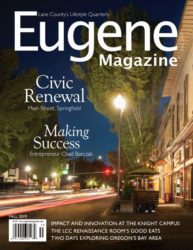Humans have a strong connection with animals. For some people, both children and adults, it’s easier to connect with animals than with their peers. It’s no wonder, then, that the desire for animal-assisted therapies has grown in recent years.
Patricia “Pat” Walters has been working in therapeutic horsemanship for more than 20 years. Raising a child with special needs who was homeschooled from age eight through college, as well as coping with her husband’s cancer diagnosis, greatly informed her work. Walters has pooled her talents—including a background in riding and experience with special education therapies—with those of Isaac Allen to open Pegasus Center in West Eugene. At Pegasus Center, students can gain “equine-assisted therapies” in a safe and supportive environment.
Equine-assisted learning
Lakeview Stables, home to Pegasus Center, sits at the top of a long, winding driveway surrounded by fields of grazing horses. Here, Walters greets her students with an enthusiastic, “Hello! Are you ready to get to work?” The beauty of her program, though, is that the students have so much fun they don’t realize they are working hard to improve their social skills, balance, coordination, coping skills, and much more.
Currently, Pegasus Center offers three main services to the community: traditional therapeutic riding, equine-assisted learning, and the homeschool HorsePlay program. HorsePlay is a 90-minute group class that meets once a week, integrating riding lessons with skill and knowledge building.
“In addition to learning horse anatomy, grooming, and care skills, students engage in fun life-skill lessons and academic building activities,” Walters says. “For example, students learn positive leadership skills through leading the pony through an obstacle course in a firm yet kind manner, and practice math skills by measuring the height of a horse.”
Pegasus Center also offers specialized individual equine-assisted learning classes that focus on a wide range of growth topics, such as empowerment, building self-esteem, improving relaxation or coping skills, and using effective communication skills. This program is unmounted, and the horse and individual work together through activities chosen based on specific goals. It’s a way to bring people together in a supportive environment, connecting with each other and the horses in a unique growth-oriented relationship.
“Many of our clients have what has been noted as ‘invisible disabilities,’ such as chronic pain, anxiety, stress, bullying, and the impact of trauma,” Walters says. “To all our clients, we aim to continually say: ‘We are here for you. We work with you in a program designed to inspire trust, empowerment, and hope.’”
Life on the farm
“In therapeutic riding, the children work on a range of goals while riding the horse, always with a side walker beside them for support,” Walters says. “For example, a student might practice core body strength, balance, and coordination by holding their arms high in the air while riding or reaching across their body and the horse to place rings around cones.”
At any given time, students in the HorsePlay program might be grooming, cleaning stalls, learning about equine history or anatomy, or working on a range of riding skills from basic use of reins to vaulting. Ms. Brandy—a 20-year-old mustang—is their riding teacher. Children learn to stop, start, steer, mount, and dismount in the stable. “We love the fun and creativity that is part of this curriculum!” Walters says. “For example, recently, students have played reading games while riding the horses in their favorite costumes. We have re-enacted the Pony Express ride, and we have made mock-ups of the horse’s hoof to show how the frog re-circulates blood up to the heart.”
Labor of love
Walters says she most enjoys “the energy of my students and the joyfulness that surrounds all the experiences here!” She adds that “even when a student is working through a difficult skill, there is an overall joyful glow that surrounds the barn. All of us—the participants, the teachers, and the horses—are part of a journey where we are growing together and supporting each other in the process. I go home every day with a smile.”
Pegasus Center, 27837 Royal Ave., 541/335-9496, www.pegasuscenter.org

